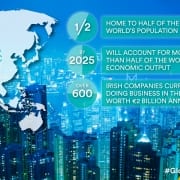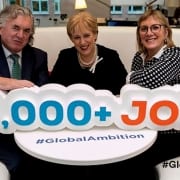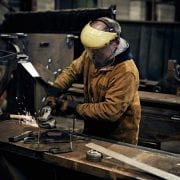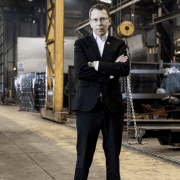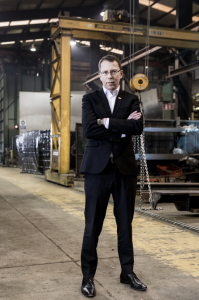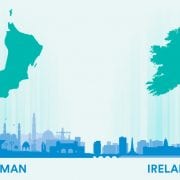How Tenderscout is helping Irish companies to win business across the world
“We’ve had Irish firms win contracts in Texas – companies who never would have looked for business beyond our shores before they started working with us.”
While every business relishes winning new contracts, few share the same enthusiasm for the tendering process. It can be laborious, consuming valuable time and requiring considerable investment, with success far from guaranteed.
One dynamic Dublin-based company, Tenderscout, is working to change that. Established by seasoned software developer and start-up specialist Tony Corrigan, the online platform was developed for Irish companies competing for tenders around the world.
Delivering expert support and specialised software, Tenderscout helps companies of all sizes to transform their approach to winning tenders, giving them the best chance to capitalise on a rapidly changing business landscape in which international borders may be no more restrictive than lines in the sand.
“We sit at the hub of the activities a company needs to complete in order to compete for global tenders,” explains Tony, who was inspired to set up the company after becoming frustrated with the inefficiencies he faced during tendering processes.
“That includes sourcing initial requests for tender, qualifying the job to assess if the company is a good fit, and then putting the proposal together.”
Irish businesses can use the Tenderscout platform to quickly find quality jobs posted around the world. The team, which numbers 10 and is growing, applies innovative technology to determine which clients are best-suited to win the tender, connecting them with expertly selected partners or consultants who can help deliver the proposal.
“For example, if you’re a business that would like to compete in Poland for an IT contract, we list companies that can provide required services in that market. That’s a huge advantage when competing internationally,” says Tony.
“We’re also building out a network of bid consultants around the world who can put together tender documents. We do some of this ourselves but primarily the platform is used to source the consultant with the expertise the bidding company needs.”
Expert knowledge of markets and sectors
Making connections with these consultants can be extremely powerful, Tony explains – whether to bridge geographical gaps and provide insights on language and cultural matters, or to offer specific sectoral subject matter expertise.
“If you’re tendering for a project to implement an IT system into a department of education, we can pair you with someone who has experience implementing IT systems into departments of education,” he explains.
Learnings from 3,000 tenders in four years
Tenderscout’s tried-and-tested framework allows the cost of partnerships to be managed to great effect.
“We’ve learned that consultants and the companies they serve don’t always share the same interests,” Tony comments. “It may be in the interests of a consultant for a job to last longer than a client company would like, for example.
By curating the relationship and providing a framework for how the process works, tenders can be developed for 60% of the cost.
We can deliver that because we’ve carried out 3,000 tenders over the past four years. It leaves us with a huge bank of reusable material, which means consultants don’t have to invent everything from scratch, so they can start working more quickly.”
Open your business to the world
One of Tenderscout’s major motivations is to change the status quo, in which most contracts are advertised and awarded to local companies.
“We work internationally ourselves, and we see that Irish companies are, in many cases, better placed to provide certain services than those in the US or Europe,” Tony says. “Particularly in areas such as software development, smart technologies, smart cities, internal productivity solutions, such as meeting room software, and other areas.
The issue is that companies are not always ambitious enough to look beyond their own borders. When they do, results are compelling. We’ve had Irish companies win contracts in Texas, companies who had never looked beyond Irish shores for business before they started working with us.”
Tony insists that companies should not allow fears or concerns about the tendering process to inhibit ambitions for growth.
“The barrier to success is not as high as people think when it comes to tendering,” he adds.
“If you were to take a random selection of tender documents and independently evaluate them, they’d score about 60%. To win, you’d need to be in the region of 90%.
“If you’re good at what you do, scoring highly shouldn’t be a problem. But the process itself can inhibit otherwise great bids.
“In short, if you put the proposal together well, you will win more often than will miss out.”
Going global with ambition
Tenderscout has become highly adept at navigating the international business landscape for clients, partly because their own journey has focused on international expansion, supported by Enterprise Ireland.
“We first became involved with Enterprise Ireland through the New Frontiers programme, then succeeded in getting a grant through the Competitive Start Fund in 2014,” recalls Tony. “From there, we were assigned an advisor, and were supported in research missions to the US and UK by the West Coast and London teams.”
While grant support was helpful in the company’s early days, the most valuable help, as with the company’s network of tendering consultants, came from creating connections and developing insights around the international markets.
“Enterprise Ireland’s support in connecting us with the local business community within each market and helping us to establish our credibility, made a real difference.”
Tech visionary Tony hopes more businesses will put their faith in the Tenderscout platform and use it to transform their fortunes.
“Tenderscout is the tool used by companies that win contracts,” says Tony. “If you’re in a situation in which you’re pitching for business, having Tenderscout in your corner is the best way to aim for success.”


